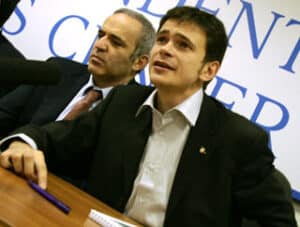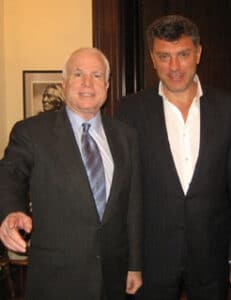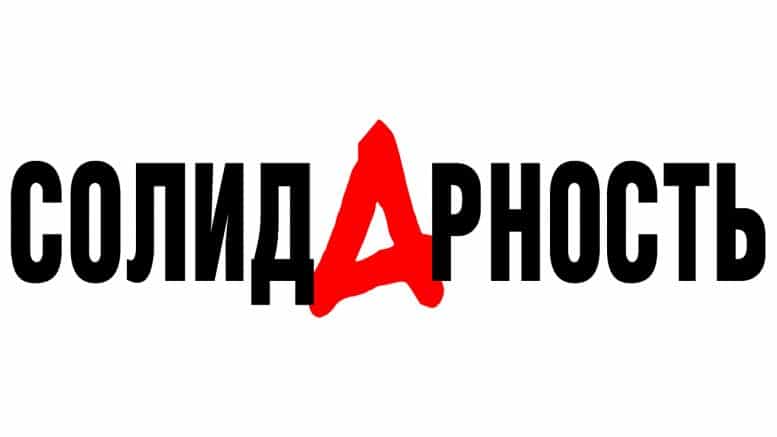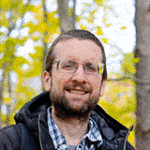The Russian liberal democratic organization Solidarity (Солидарность) was founded in December 2008 by a range of opposition activists. These included several members of the political parties Yabloko (Яблоко), the Union of Right Forces (Союз Правых Сил; commonly referred to as СПС or SPS) as well as a range of other figures from other organizations, protest groups, movements, and parties.

Ilya Yashin and Gary Kasparov at a press conference for Solidarity. Picture from yashin.livejournal.com
SPS and Yabloko had long been negotiating a merger, but were never successful largely due to disagreement over what leadership structure the new organization should have. However, both also saw their popularity and election results slide for nearly a decade after 1997. By 2008, they and many other opposition parties were literally struggling for survival.
In October 2008, SPS merged with the Democratic Party of Russia (Демократическая Партия России) and Civil Force (Гражданская Сила) to create Pravoe Delo (Правое Дело), a new business- and free-market-focused political party. Some members of SPS refused to join this new coalition, claiming that it was a Kremlin-backed party not interested in pursuing genuinely democratic reforms. Following former SPS leader Boris Nemtsov, these dissenters instead joined the movement that would become Solidarity.
Nemtsov, now one of Solidarity’s most visible leaders, had initially served as Deputy Prime Minister under Boris Yeltsin from 1997 to 1998. He co-founded SPS in 1999 and led the faction in the State Duma. However, Nemtsov began to clash with others within the party during Vladimir Putin’s presidency. Originally a Putin supporter, he disagreed with what he saw as the administration’s rolling back of democratic reforms. Due to the resultant infighting, the party platform and message became increasingly muddled and the party began to lose support.
Certain Yabloko members were also instrumental in forming Solidarity. The most notable of these was Ilya Yashin, who once headed Yabloko’s youth movement and was said by some to be the likely next leader of the party. However, shortly after the new organization was founded, the Moscow division of Yabloko voted to expel Yashin for his association with Solidarity, saying that its leaders held “political and personal reputations which are unacceptable for [Yabloko].”

Boris Nemtov meets US Senator John McCain.
Also in response to Solidarity’s founding, Yabloko passed a new rule that no member of the party was allowed to participate in any other movement or party. This caused a rift within Yabloko, drawing direct criticism from the head of Yabloko’s St. Petersburg chapter and several other high-profile members of the party. Several members, especially younger members connected to Yashin, left to join the new Solidarity Movement. This left Yabloko, once Russia’s most promising liberal democratic party, in an even more deteriorated position than before.
Another of Solidarity’s most prominent – and controversial – leaders is chess champion Garry Kasparov. After leaving professional chess in 2005, Kasparov helped create the Other Russia (Другая Россия) movement. Other Russia counts itself as a “social-political movement” (not a political party) which opposes Putin’s government and seeks to “expose bias in the Russian media.”
Kasparov is perhaps better known in the West than he is in Russia, as most of his interviews are in English for western news sources. In the past, he has often yelled comments to the press in English as he is being arrested for holding unsanctioned demonstrations. It is widely known that Other Russia has structures set up in America and widely suspected that at least part of its funding comes from foreign sources. This has not garnered him much support in Russia, and has even led Prime Minister Vladimir Putin to criticize him for devoting most of his time to “working the crowd of other nations.”
Kasparov and Nemtsov began working together when the two became co-chairs of “A New Agenda for Russia’s Democratic Movement,” a conference that took place in St. Petersburg in April of 2008. More than 250 democratic activists from across Russia took part in the conference. During this meeting, both Kasparov and Nemtsov were adamant in saying that the country’s opposition parties needed to learn to work together. Solidarity was formed shortly thereafter.
Solidarity calls itself a “united democratic movement” and has stated that its main goal is promoting cooperation between Russia’s many fractured democratic opposition parties and movements on both the right and left, bringing together liberals, nationalists, radicals, and moderates. Like Other Russia, Solidarity is not a political party and does not itself participate in elections. Its members are free to participate in any other party or organization.
| Part I | Part II |
|
Дорожная карта План действий движения “Солидарность”. |
Road Map Action Plan for the Solidarity Movement |
| Политическая ситуация в России |
The Political Situation in Russia |
| События августа-сентября 2008 г. – война с Грузией и последующие действия российских властей, направленные на эскалацию внутриполитической и внешнеполитической напряженности, – во многом расставили точки над «i» в вопросе о возможности наступления в России «политической оттепели», «либерализации сверху». Иллюзии о возможности такой либерализации развеяны. Стало очевидным: мы имеем дело с безответственным и агрессивным политическим режимом, способным на непредсказуемые, авантюристические, неадекватные действия. Режимом, игнорирующим стратегические интересы России и российского народа, грубо попирающим и без того эфемерные конституционные нормы, толкающим нашу страну к конфронтации с внешним миром, которая обернется для нашей страны огромными издержками. | The events of August and September of 2008— the war with Georgia and the subsequent actions of the Russian authorities have caused internal and foreign political tensions to escalate. They have, in many respects, dotted the “i”s in answering questions as to weather a “political thaw” or “liberalization from above” are possible in Russia. Any illusions about such possibilities have been dispelled. It has been made clear that we are dealing with an irresponsible, aggressive political regime capable of inappropriate, adventurist, and unpredictable actions. This regime ignores the strategic interests of Russia, crudely trampling its constitution when not projecting fantasies upon it, and pushing our country into a confrontation with the rest of the world that will carry enormous consequences. |
| С момента формальной смены президента Российской Федерации в мае 2008 г. властью не было предпринято никаких шагов, способных доказать ее намерения, направленные на демократизацию общественно-политической системы страны. Напротив, получены новые сигналы об эскалации произвола авторитарного режима в отношении собственного народа – усиление цензуры в СМИ, безапелляционное снятие оппозиционных партий с региональных выборов, убийство представителями власти средь бела дня выстрелом в упор известного ингушского оппозиционного журналиста Магомеда Евлоева, отказ в условно-досрочном освобождении Михаила Ходорковского. | Since the formal change of the President of the Russian Federation in May 2008, the government has taken no steps to prove its intentions to bring a democratic socio-political system to Russia. Instead, new signals have been sent showing the escalation of the tyranny of an authoritarian regime against its own people: censorship of the media has been strengthened, opposition parties have been preemptively banned from running in regional elections, Magomed Yevloyev (a well-known Ingush opposition journalist) has been murdered by government representatives in clear light of day, and Mikhail Khodorkovsky parole. |
| Дальнейшие надежды на добровольные шаги путинского режима по либерализации общественно-политической обстановки в стране потеряли смысл. Россияне, желающие скорейшей демократизации своей страны, больше не могут позволить себе ждать от власти хороших новостей. | To hope that the Putin Regime may voluntarily take steps to liberalize the political system is illogical. Russians who desire a speedy democratization of their country can no longer await good news from the authorities. |
| Официальная политическая система не дает россиянам шанса быть услышанными и добиться адекватного представительства своих интересов. Последние события показывают, что сформированный по итогам несправедливых и нечестных избирательных процедур «парламент» не в состоянии представлять интересы граждан страны, являясь лишь послушным инструментом в руках исполнительной власти. | The official political system does not give Russians a chance to be heard nor to adequately express their interests. The recent elections for “parliament” have been shown to be wholly unfair and dishonest. They were not representative of the interests of Russia’s citizens, but rather shown be an instrument answering to the will of those in power. |
| Отсутствие политических и гражданских свобод ведет к грубым ошибкам, совершаемым властью с участившейся регулярностью. Война, серьезные трудности в экономике, резкое ухудшение отношений с большинством стран мира – все это уже в ближайшее время способно привести к значительному снижению качества жизни людей в нашей стране. | The lack of political and civil liberties has led authorities to commit crude errors with increasing regularity. The war, serious difficulties in the economy, sharp deteriorations in our relationships with most countries around the world — in the near future, all of this could result in a significant reduction in the quality of life for the people of our country. |
| Для предотвращения этого россияне должны вернуть себе возможность влиять на внутреннюю и внешнюю политику страны через нормальные демократические институты и процедуры. Сегодня официальная политическая система таких возможностей гражданам России не предоставляет. | To prevent this, Russians need to regain their ability to influence foreign and domestic policy through normal democratic institutions and procedures. Today the official political system of Russia does not grant these opportunities to Russian citizens. |
| Это означает, что для политических сил демократической ориентации, добивающихся восстановления в России попранных гражданских прав и свобод, законности, демократии, основной стратегической целью является смена политического режима. | This means that for democratically oriented political forces, changing the political regime is the most crucial step to restoring Russia’s trampled civil rights, freedoms, rule of law, and democracy. |
| Демократическая оппозиция | Democratic Opposition |
| Российская демократическая оппозиция – реальная политическая альтернатива тупиковому курсу, навязываемому стране действующей властью. Российская демократическая оппозиция видит своей основной стратегической целью переход государства и общества к демократическим и правовым институтам власти. | The Russian democratic opposition is a real alternative to the dead-end course the current government is forcing on the country. The Russian democratic opposition’s primary objective is to transition the state and society to democratic governance based on the rule of law. |
| Несмотря на значительные трудности внутреннего и внешнего характера, демократическая оппозиция в России жива и продолжает действовать. Прошедшая в Санкт-Петербурге 5 апреля 2008 года объединительная конференция демократических сил, и последующее развитие диалога между демократами показывают, что сближение позиций и объединение усилий российских демократов в борьбе за возвращение прав и свобод россиян возможны. | Despite considerable internal and external difficulties, the Russian democratic opposition is alive and continues to take action. A joint conference of the country’s democratic forces was held in St. Petersburg on April 5, 2008. The developing dialog between democrats at this meeting showed that finding common ground and joining forces to fight to return the rights and freedoms of Russians is possible. |
| Демократические движения и партии обладают наибольшим среди всех политических сил невыбранным потенциалом гражданской поддержки. Опросы общественного мнения показывают, что даже сегодня, в условиях тотальной цензуры, к последовательным сторонникам демократических, европейских ценностей можно отнести не менее 20-30% россиян, обладающих избирательным правом. В числе этих граждан – наиболее активные члены общества. | Out of all political forces, the democratic movements and parties possess the most untapped, potential public support. Public opinion polls show that even today, in a time of total censorship, at least 20-30% of Russians with the right to vote consistently support democratic European values. Among these citizens are some of the most active members of society. |
| Задача завоевания доверия и авторитета у граждан. | What is needed is to gain trust and establish credibility among Russia’s citizens. |
| До настоящего момента ни одна из существующих демократических партий и организаций не смогла поодиночке даже приблизиться к решению этой задачи и не имеет таких перспектив. Недостаток внимания к значимым для значительной части общества социально-экономическим проблемам, а также разногласия между политическими силами демократической направленности снижают доверие граждан к демократам. Оттенки политических позиций отдельных партий и организаций сами по себе не в состоянии привлечь широкую поддержку – людям неинтересно разбираться в тонкостях различия позиций между демократами. | To date, none of the existing democratic parties or organizations has even come close to accomplishing this, nor are they likely to do so. Lack of attention to those significant socio-economic issues which affect significant portions of the population, as well as the fractured nature of the democratic political forces have reduced the public’s confidence in the democrats. The rainbow of positions held among the various political parties and organizations cannot attract wide support because people are not interested in sorting out the subtle differences between the democratic forces. |
| Раздельное существование различных демократических сил бесперспективно. Необходима консолидация на базе широкой объединительной политической платформы. | Existing separately, the various democratic forces have no future. They must be consolidated under a broad and uniting political platform. |
| Осознание этого факта легло в основу процесса объединения российских демократических сил, инициированного весной 2008 года. Процесс консолидации и координации действий развивается. На общероссийском Съезде демократических сил, запланированном на декабрь 2008 года, должно быть принято решение о создании общероссийского Объединенного демократического движения (ОДД). | The realization of this fact led to the beginning of a process to unite Russian democratic forces in the spring of 2008. The processes of consolidation and coordinating efforts has been ongoing. A decision to establish a United Democratic Movement (UDM) must be made at All-Russia Congress of Democratic Forces, planned for December, 2008. |
| Отдельные представители демократического лагеря продолжают занимать скептическую позицию по поводу консолидации российских демократов. Спектр их аргументов широк – от выжидательной позиции и утверждений о том, что «все делается неправильно», до акцента на отстаивание собственной «политической идентичности» до конца, или расчета на некие позиции в официальной политической системе. | Some within the democratic camp remain skeptical about the consolidation of the Russian democrats. The range of their arguments is extremely wide—from positions of wait-and-see to confirm that “everything has been done wrong,” to defending their own “political identity” to the very end, or pushing for a particular position within the official political system. |
| Такая позиция в сегодняшних условиях не может быть признана оправдывающей ожидания демократически настроенных россиян. Условия для участия демократической оппозиции в федеральных выборах в рамках путинского политического режима полностью отсутствуют. Как показали «выборные процедуры» 2007 года, зарегистрированные оппозиционные партии не имеют шанса пройти в федеральный парламент из-за массированного полицейского прессинга, цензуры, неравенства условий ведения избирательной кампании, массовых фальсификаций. Незарегистрированные оппозиционные политические организации не имеют шанса получить официальную регистрацию. Даже зарегистрированным политическим партиям угрожают различные формы разгрома. | These positions, in today’s world, cannot be considered justified expectations among democratically minded Russians. Under Putin’s political regime, the conditions for our democratic opposition to participate in Federal elections do not exist. As the “election procedures” of 2007 showed, registered opposition parties have no chance to enter parliament because of massive police pressure, censorship, unequal campaign conditions, and the massive falsification of results. Unregistered opposition parties have no hope receive official registration. Even registered political parties are threatened with various forms of crackdown. |
| В рамках управляемой Кремлем политической системы у демократов на федеральном уровне нет возможности честно конкурировать с другими политическими силами в официальном политическом пространстве. Более того – участие в контролируемых «выборных процедурах» противоречит демократическим принципам и дискредитирует демократических политиков в глазах нынешних и потенциальных сторонников. | Under the Kremlin-controlled political system, the democrats have no possibility to compete fairly on the federal level with other political forces. Furthermore, participation in the current controlled “elective procedures” as they now exist would go against our core democratic values and discredit us in the eyes of our supporters, both active and potential. |
| Для решения тактических и стратегических задач по демократизации российского политического пространства российским демократам необходимо преодолеть разногласия, консолидироваться, установить доверие к своим целям и деятельности у широких слоёв населения. Только таким образом можно обеспечить демократическим идеям более широкую общественную поддержку, чем сегодня. | To accomplish the tactical and strategic goals involved in democratizing the Russian political system, democratic forces must first overcome their differences and consolidate. They must establish their goals and activites as credible among a wide section of the population. Only in this way can democratic ideas achieve greater public support than they enjoy today. |
| По оценкам исследований общественного мнения, совокупное число граждан, готовых поддержать объединенную демократическую организацию, выше, чем число людей, поддерживающих существующие партии и организации. Консолидация демократов не является самоцелью, «объединением ради объединения», как утверждают отдельные политики. Консолидация – эффективное средство увеличения массовости поддержки демократических сил российскими гражданами. Это единственный путь к решению стратегической цели российских демократов. | According public opinion polls, the total number of people willing to support a united democratic party far outnumbers those already supporting existing parties and organizations. The consolidation of Russia’s democrats is not “unification for the sake of unification.” Consolidation is an effective means of increasing mass support of the democratic forces among Russian citizens. It is the only way to achieve the strategic objective of Russia’s democrats. |
| Цели и задачи Объединенного демократического движения «Солидарность» |
Goals and Objectives of the Solidarity United Democratic Movement |
| Объединенное демократическое движение «Солидарность» (далее ОДД, Движение) создается как постоянно действующий механизм координации действий различных демократических сил России. Для придания процессу координации действий необходимой гибкости и во избежание отталкивания отдельных участников Движения через навязывание им жестких организационных конструкций ОДД на первом этапе создается в виде движения без образования юридического лица. ОДД будет иметь сеть региональных отделений, формирование которых начнется в ходе проведения демократических конференций осенью 2008 года. | The Solidarity United Democratic Movement (hereinafter “UDM” or “Movement”) has been established as a permanent mechanism to coordinate the actions of Russia’s various democratic forces. To allow for this coordination process, the organization must be flexible and to avoid losing individual members. Therefore, in its first stage, the UDM will take the form of a movement without registering as a legal entity. UDM will have a network of regional branches, and will begin to establish them at the Democratic Conference in fall 2008. |
| Тем не менее, стратегическая цель Движения – преобразование в единую политическую партию. После того как ОДД завоюет массовую поддержку и авторитет, нашей целью будет формирование на его базе мощной демократической политической партии, участвующей в выборах и претендующей на участие в формировании правительства парламентского большинства для обеспечения реализации программных установок Движения. | Nevertheless, the ultimate goal of the Movement is to transform into a unified political party. After UDM gains mass support and popularity, our goal will be to build a strong democratic political party on this base, to participate in elections, and form a parliamentary majority to ensure the implementation of our policies. |
| Однако преобразование в партию, и тем более участие в свободных и честных выборах, нереализуемо в нынешних политических условиях. Поэтому данные задачи рассматриваются как задачи будущего. | However, to reorganize into a party, and further to participate in free and fair elections, is unrealistic under current political conditions. Therefore, this particular task is seen as a task for the future. |
| Главная задача ОДД на данном этапе – расширение числа сторонников демократических сил и организация массовых гражданских акций и кампаний для осуществления давления на власти с целью понуждения их к реальным шагам по демократизации страны. | The main task of the UDM at this stage is to increase the number of supporters for democratic forces and organizations through mass civil demonstrations and campaigns to apply social pressure to the government, necessitating that they take real steps towards democratizing the country. |
| Условия для этого будут расширяться. Во-первых, объединение усилий демократов и формирование политической организации, включающей в себя наибольшее число авторитетных демократических политиков страны, должно стать фактором роста интереса граждан к демократическому движению. Во-вторых, популярность существующей власти неизбежно пойдет на спад из-за нарастающих проблем страны, прежде всего проблем в экономической сфере, вызванных провалами в деятельности правящего режима, некомпетентностью его экономической политики. | Now we must expand on how this will be accomplished. First, uniting the energies of democrats and forming a political organization that contains most of the country’s popular democratic politicians, should contribute to a growth in public interest in the democratic movement. Secondly, the popularity of those in power will inevitably decline due to the increasing problems faced by the country—especially in the economy, where the problems were caused by which were brought about the floundering of the ruling regime and the incompetence of their economic policies. |
| Демократы обязаны эффективно использовать открывающиеся «окна возможностей» для разъяснения гражданам, введенным в заблуждение официальной пропагандой, истинного положения дел в стране и провалов в деятельности власти. | Democrats must use this “window of opportunity” to effectively show the citizenry that that the official propaganda is delusional and show the true state of affairs in the country and of the bankruptcy of the government’s current efforts. |
| Part I | Part II |



